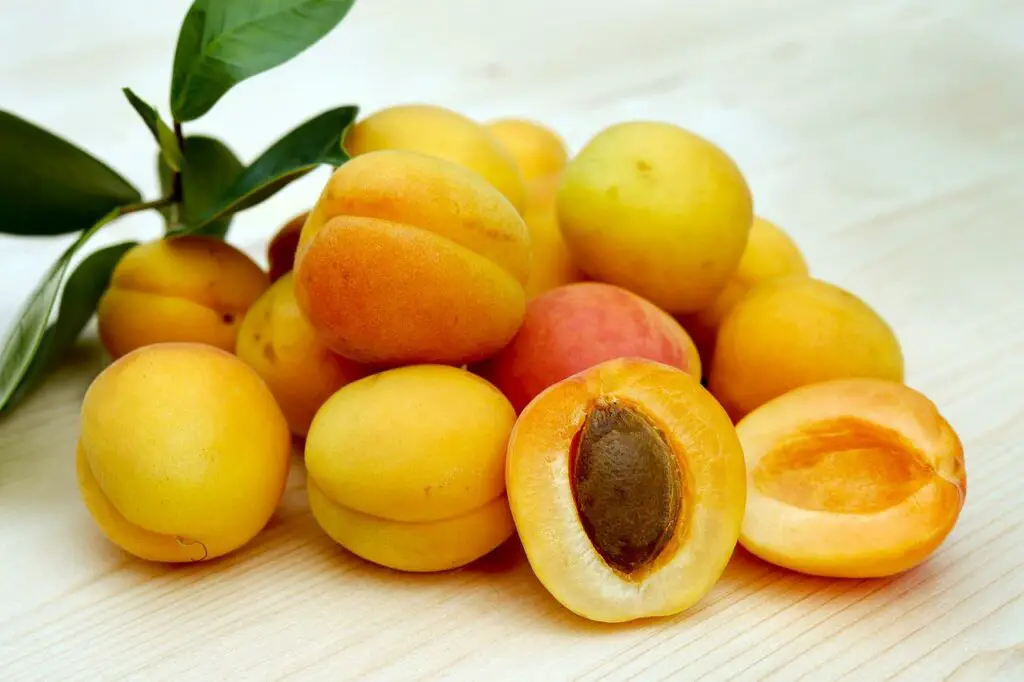Apricots are one of the best-known stone fruits.
They are easy to grow, making it an attractive choice for home gardeners.
Their unique balance of taste, texture, and aroma makes people love to snack on them!
Your dog may quickly munch on these delectable delights when they fall off the tree.
However, you get worried because you don’t know if apricots are good for dogs.
So, are apricots good for dogs?
Yes, apricots are good for dogs.
They contain fiber, vitamin c, potassium, vitamin A, and beta carotene.
However, ensure that you remove the pits and seeds because they contain cyanide which is to dogs.
This article will look into the nutritional value, serving methods, risks, and whether dogs can eat apricots under different conditions.

The nutritional value of apricot to dogs
Fiber
Apricots contain dietary fiber that helps regulate digestion and keeps the bowels healthy.
It also helps control blood sugar levels by slowing down the rate at which sugars are absorbed into the bloodstream from the dog’s intestines.
Vitamin A
Apricots contain vitamin A, an essential nutrient for normal vision, immune system function, reproduction, and healthy skin.
It also helps reduce levels of free radicals that cause cellular damage leading to various diseases like cancer and cardiovascular diseases.
Potassium
Apricots are rich in potassium, which helps reduce the risk of heart disease and stroke by lowering blood pressure.
It also helps regulate heart rhythm and contractions during exercise by preventing dehydration.
Vitamin C
Vitamin C is essential for growth, connective tissue formation and helps your dog fight infections.
It also boosts the immune system and helps prevent scurvy.
Apricots are an especially good source of vitamin C because their skin contains more than most fruits.
Beta carotene
Beta carotene is an antioxidant nutrient found naturally in apricots that helps protect cells from damage caused by free radicals.
It also promotes healthy growth and the development of new tissues in puppies during their growing years.
Antioxidants
Apricots contain antioxidants that help keep your dog’s skin healthy and free from problems such as itching or rashes.
They have antioxidant properties which help to protect against cancer and other diseases.

Can dogs have apricot yogurt?
Yes, dogs can have apricot yogurt as a treat.
The main thing is to check the ingredients list.
Avoid too much sugar or artificial sweeteners.
Also, be careful with the amount of apricot yogurt you give your dog because it can cause diarrhea if they take too much.
It’s also important to feed your puppies small amounts if it’s the first time so that you can monitor their reaction to it.
If your dogs are allergic to any ingredient in the yogurt, stop feeding them immediately.
Risks of apricots to dogs
Although apricots are safe for dogs in small quantities, they can cause problems if eaten in large amounts or if your dog has allergies to apricots.
Cyanide poisoning
The main risk with apricots is cyanide poisoning.
There are different types of cyanide in apricots, so you must watch your dog closely if they eat them.
Cyanide poisoning happens when a dog eats large amounts of these fruits at once or over a long period.
It can also occur if they eat large amounts of apricots’ pits or seeds.
When your dog eats them unattended, look for any symptoms for the next 24hours.
Call your veterinarian if the signs are severe.
Choking
Apricot pits are large and hard, so they pose a choking hazard to dogs.
The pit can get stuck in your dog’s throat as he chews on it, causing him to choke.
Ensure that you remove the pits and seeds, then cut the flesh into smaller pieces.
Stomach Upset
Dogs have trouble digesting the cellulose found in apricots, which can cause stomach upset.
If you feed your dog too many of these fruits, their stomach may become bloated and painful as the apricot sits undigested for hours.
Moreover, your dog may also develop diarrhea if they eat many apricots because of their high fiber content.
How to serve apricots to dogs
Slicing– Cut apricots into small pieces about an inch long and offer them on their own as treats or rewards for good behavior.
You can add them to your dog’s food bowl alone or alongside other fruits such as apples or pears.
Smoothie– Another option for serving apricots to dogs is to mix them with other ingredients and make a smoothie.
You could try mixing them with yogurt or cottage cheese, depending on what your dog enjoys eating most.
Apricot Juice– You can give your dog some apricot juice if they enjoy drinking water.
Just pour some into a bowl and let them lap it up! Just ensure that the juice doesn’t have added sugars or other additives.
Apricot Puree– If your dog is not used to eating fresh fruits and vegetables, you can start by making an apricot puree.
To make this, cut up the apricots into small pieces and puree them in a blender or food processor until they are smooth.
For added nutrition, you can also puree them with other fruits such as bananas or blueberries.
Can dogs eat dried apricot?
Yes, dogs can eat dried apricots.
Dried apricots are safe for dogs to eat because they are mostly destoned and have more nutrients.
However, look at the label for harmful ingredients such as additives and artificial sweeteners.
Conclusion
Hopefully, this article helped answer your question on whether apricots are good for dogs.
Don’t feel guilty about feeding your canine with apricots the next time you feed your family.
However, ensure you remove the pit and seeds because they have traces of cyanide which is toxic for dogs when taken in large quantities.
If your dogs eat too many apricots, observe them for 24 hours to see whether they show any sicky symptoms.
Call your veterinarian or visit the nearest vet clinic if the symptoms are severe.
- What Dog Breeds Have Pink Skin? - March 24, 2023
- What Are the Most Inspiring Dog Breeding Quotes? - March 20, 2023
- Can Pheromone Spray Help Improve Dog Breeding Results? - March 19, 2023








